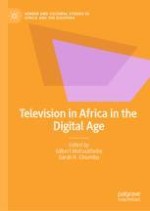2021 | OriginalPaper | Chapter
Dilemmas in Zimbabwe’s Public Broadcasting in the Era of Digitisation
Authors : Trust Matsilele, Golden Maunganidze, Pedzisai Ruhanya
Published in: Television in Africa in the Digital Age
Publisher: Springer International Publishing
Activate our intelligent search to find suitable subject content or patents.
Select sections of text to find matching patents with Artificial Intelligence. powered by
Select sections of text to find additional relevant content using AI-assisted search. powered by
